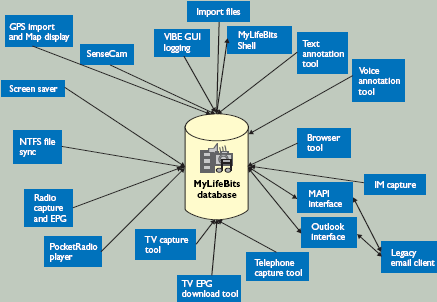Your entire life in a hard drive

Would you want a digital archive of your life? Every memory, every encounter, every click, every breath and damn near everything?
Two researchers at Microsoft Research think so.
In the March issue of Scientific American Microsoft researchers Gordon Bell and Jim Gemmell outlined a digital life experiment called MyLifeBits. Armed with an endless stream of cheap storage these guys are recording every aspect of daily life.
This duo writes:
Human memory can be maddeningly elusive. We stumble upon its limitations every day, when we forget a friend's telephone number, the name of a business contact or the title of a favorite book. People have developed a variety of strategies for combating forgetfulness--messages scribbled on Post-it notes, for example, or electronic address books carried in handheld devices--but important information continues to slip through the cracks. Recently, however, our team at Microsoft Research has begun a quest to digitally chronicle every aspect of a person's life, starting with one of our own lives (Bell's). For the past six years, we have attempted to record all of Bell's communications with other people and machines, as well as the images he sees, the sounds he hears and the Web sites he visits--storing everything in a personal digital archive that is both searchable and secure.
The applications are obvious especially as we age and Alzheimers becomes more prevalent.
Below is your life in a network (credit: Microsoft Research)
The biggest enabler is storage. Today, 60 years of your life can be stored for $600 in gear. The Microsoft researchers predict that "in 20 years $600 will buy 250 terabytes of storage--enough to hold tens of thousands of hours of video and tens of millions of photographs. This capacity should be able to satisfy anyone's recording needs for more than 100 years."
The downside: It's all a bit big brother-ish. Privacy? A hacker could access my vital signs. I have no idea why someone would want that information, but it's a bit strange.
Bell and Gemmell also write of a SenseCam, "a camera developed by Microsoft Research that automatically takes pictures when its sensors indicate that the user might want a photograph." If SenseCam detects a warm body it takes a picture. If light changes as a person moves to another room the camera takes a picture. They write:
"A recent study led by researchers at Addenbrooke's Hospital in Cambridge, England, showed that a memory-impaired patient who reviewed SenseCam images every night was able to retain memories for more than two months."
That's pretty useful. But if you're in the locker room it's a different story. Why is Microsoft tinkering with this digital archive on steroids idea? This information will ultimately be dished out by that Home Server sitting in your closet.
The Scientific American story is part of a bevy of Microsoft Research coverage this week. Some recommended reading on Microsoft Research:
- Microsoft Research: MyLifeBits Project page.
- Microsoft Research paper on MyLifeBits.
- Scientific American: Graph theory and teatime.
- Video: Get a glimpse of Microsoft's emerging technologies.
- Microsoft's research labs offer freebies.
- Microsoft Research shows off what’s next for search.